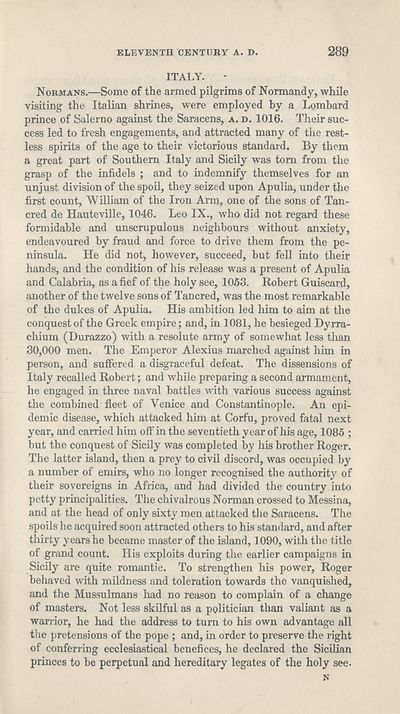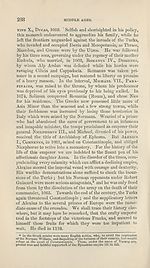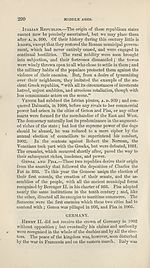Download files
Complete book:
Individual page:
Thumbnail gallery: Grid view | List view

ELEVENTH CENTURY A. D.
ITALY.
Normans.—Some of the armed pilgrims of Normandy, while
visiting the Italian shrines, were employed by a Lombard
prince of Salerno against the Saracens, a. d. 1016. Their suc¬
cess led to fresh engagements, and attracted many of the rest¬
less spirits of the age to their victorious standard. By them
a great part of Southern Italy and Sicily was tom from the
grasp of the infidels ; and to indemnify themselves for an
unjust division of the spoil, they seized upon Apulia, under the
first count, William of the Iron Arm, one of the sons of Tan-
cred de Hauteville, 1046. Leo IX., who did not regard these
formidable and unscrupulous neighbours without anxiety,
endeavoured by fraud and force to drive them from the pe¬
ninsula. He did not, however, succeed, but fell into their
hands, and the condition of his release was a present of Apulia
and Calabria, as a fief of the holy see, 1053. Robert Guiscard,
another of the twelve sons of Tancred, was the most remarkable
of the dukes of Apulia. His ambition led him to aim at the
conquest of the Greek empire; and, in 1081, he besieged Dy rra-
chium (Durazzo) with a resolute army of somewhat less than
30,000 men. The Emperor Alexius marched against him in
person, and suffered a disgraceful defeat. The dissensions of
Italy recalled Robert; and while preparing a second armament,
he engaged in three naval battles with various success against
the combined fleet of Venice and Constantinople. An epi¬
demic disease, which attacked him at Corfu, proved fatal next
year, and earned him off in the seventieth year of his age, 1085 ;
but the conquest of Sicily was completed by his brother Roger.
The latter island, then a prey to civil discord, was occupied by
a number of emirs, who no longer recognised the authority of
their sovereigns in Africa, and had divided the country into
petty principalities. The chivalrous Norman crossed to Messina,
and at the head of only sixty men attacked the Saracens. The
spoils he acquired soon attracted others to his standard, and after
thirty years he became master of the island, 1090, with the title
of grand count. His exploits during the earlier campaigns in
Sicily are quite romantic. To strengthen his power, Roger
behaved with mildness and toleration towards the vanquished,
and the Mussulmans had no reason to complain of a change
of masters. Not less skilful as a politician than valiant as a
warrior, he had the address to turn to his own advantage all
the pretensions of the pope ; and, in order to preserve the right
of conferring ecclesiastical benefices, he declared the Sicilian
princes to be perpetual and hereditary legates of the holy see.
ITALY.
Normans.—Some of the armed pilgrims of Normandy, while
visiting the Italian shrines, were employed by a Lombard
prince of Salerno against the Saracens, a. d. 1016. Their suc¬
cess led to fresh engagements, and attracted many of the rest¬
less spirits of the age to their victorious standard. By them
a great part of Southern Italy and Sicily was tom from the
grasp of the infidels ; and to indemnify themselves for an
unjust division of the spoil, they seized upon Apulia, under the
first count, William of the Iron Arm, one of the sons of Tan-
cred de Hauteville, 1046. Leo IX., who did not regard these
formidable and unscrupulous neighbours without anxiety,
endeavoured by fraud and force to drive them from the pe¬
ninsula. He did not, however, succeed, but fell into their
hands, and the condition of his release was a present of Apulia
and Calabria, as a fief of the holy see, 1053. Robert Guiscard,
another of the twelve sons of Tancred, was the most remarkable
of the dukes of Apulia. His ambition led him to aim at the
conquest of the Greek empire; and, in 1081, he besieged Dy rra-
chium (Durazzo) with a resolute army of somewhat less than
30,000 men. The Emperor Alexius marched against him in
person, and suffered a disgraceful defeat. The dissensions of
Italy recalled Robert; and while preparing a second armament,
he engaged in three naval battles with various success against
the combined fleet of Venice and Constantinople. An epi¬
demic disease, which attacked him at Corfu, proved fatal next
year, and earned him off in the seventieth year of his age, 1085 ;
but the conquest of Sicily was completed by his brother Roger.
The latter island, then a prey to civil discord, was occupied by
a number of emirs, who no longer recognised the authority of
their sovereigns in Africa, and had divided the country into
petty principalities. The chivalrous Norman crossed to Messina,
and at the head of only sixty men attacked the Saracens. The
spoils he acquired soon attracted others to his standard, and after
thirty years he became master of the island, 1090, with the title
of grand count. His exploits during the earlier campaigns in
Sicily are quite romantic. To strengthen his power, Roger
behaved with mildness and toleration towards the vanquished,
and the Mussulmans had no reason to complain of a change
of masters. Not less skilful as a politician than valiant as a
warrior, he had the address to turn to his own advantage all
the pretensions of the pope ; and, in order to preserve the right
of conferring ecclesiastical benefices, he declared the Sicilian
princes to be perpetual and hereditary legates of the holy see.
Set display mode to:
![]() Universal Viewer |
Universal Viewer | ![]() Mirador |
Large image | Transcription
Mirador |
Large image | Transcription
| Antiquarian books of Scotland > Education > Elements of universal history on a new and systematic plan > (309) |
|---|
| Permanent URL | https://digital.nls.uk/127583848 |
|---|
| Description | Thousands of printed books from the Antiquarian Books of Scotland collection which dates from 1641 to the 1980s. The collection consists of 14,800 books which were published in Scotland or have a Scottish connection, e.g. through the author, printer or owner. Subjects covered include sport, education, diseases, adventure, occupations, Jacobites, politics and religion. Among the 29 languages represented are English, Gaelic, Italian, French, Russian and Swedish. |
|---|

